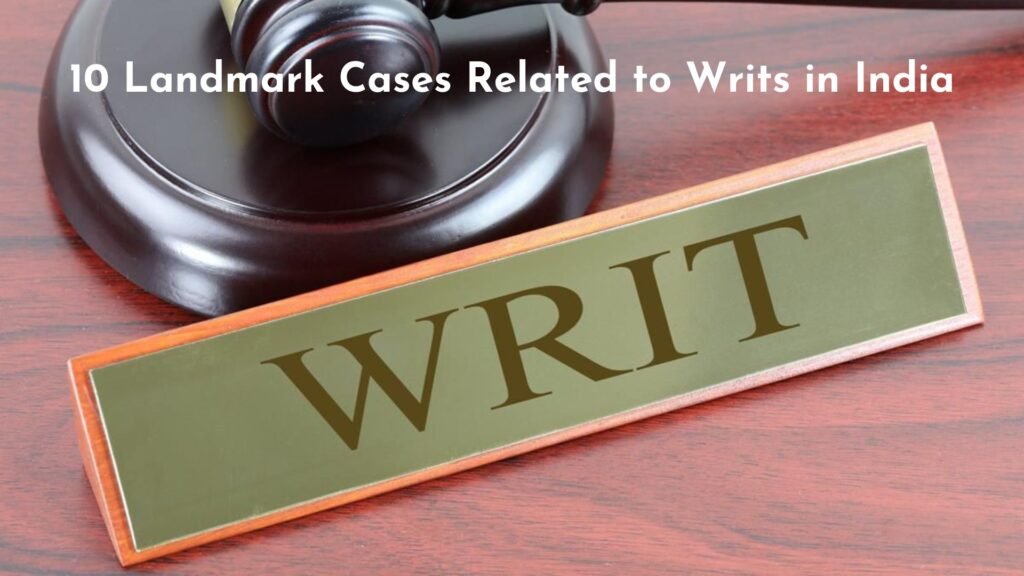Here are ten landmark cases related to writs in India:
- Golak Nath v. State of Punjab (1967) – This case involved a challenge to the constitutional validity of the 25th Amendment to the Constitution of India, which had allowed the Parliament to amend any part of the Constitution, including the fundamental rights. The Supreme Court held that the Parliament did not have the power to amend the fundamental rights and that the 25th Amendment was unconstitutional.
- Kesavananda Bharati v. State of Kerala (1973) – This case involved a challenge to the constitutional validity of the 24th Amendment to the Constitution of India, which had amended Article 31C to allow the state to implement any law for the purpose of giving effect to the Directive Principles of State Policy, even if it infringed upon any of the fundamental rights guaranteed under Part III of the Constitution. The Supreme Court held that the 24th Amendment was constitutional, but also laid down the \”basic structure\” doctrine, which held that certain fundamental features of the Constitution, including the fundamental rights, could not be amended by the Parliament.
- Maneka Gandhi v. Union of India (1978) – This case involved a challenge to the constitutional validity of the Passport Act, 1967, which had allowed the government to impound or confiscate a passport without giving the holder a reasonable opportunity to be heard. The Supreme Court held that the Act violated the right to personal liberty and the principle of natural justice, and laid down the \”reasonableness\” test, which held that any restriction on a fundamental right must be reasonable and in accordance with the principles of natural justice.
- Indira Gandhi v. Raj Narain (1975) – This case involved a challenge to the election of Indira Gandhi as the Prime Minister of India, on the grounds that she had used her official position to secure an unfair advantage in the election. The Supreme Court held that the election was void and disqualified Indira Gandhi from holding any public office for a period of six years.
- Hussainara Khatoon v. Home Secretary, State of Bihar (1979) – This case involved a challenge to the detention of thousands of under-trial prisoners in the state of Bihar, who had been held in custody for long periods of time without being charged or tried. The Supreme Court held that the detention of the prisoners was illegal and ordered their immediate release.
- People\’s Union for Civil Liberties v. Union of India (1997) – This case involved a challenge to the constitutional validity of the Prevention of Terrorism Act (POTA), 2002, which had allowed the detention of individuals suspected of terrorism without a judicial review for up to 180 days. The Supreme Court held that POTA violated the right to personal liberty and the principle of natural justice, and struck down several provisions of the Act as unconstitutional.
- R. Dongre v. Union of India (2003) – This case involved a challenge to the constitutional validity of the Maharashtra Control of Organised Crime Act (MCOCA), 1999, which had allowed the detention of individuals suspected of organized crime without a judicial review for up to 180 days. The Supreme Court held that MCOCA violated the right to personal liberty and the principle of natural justice, and struck down several provisions of the Act as unconstitutional.
- ADM Jabalpur v. Shivakant Shukla (1976) – This case involved a challenge to the constitutional validity of the Maintenance of Internal Security Act (MISA), which had allowed the government to detain individuals suspected of endangering national security without a judicial review for an indefinite period of time. The Supreme Court held that MISA was constitutional and that the fundamental rights of the detainees could be suspended during the state of emergency. This decision was later overturned by the Supreme Court in the case of Maneka Gandhi v. Union of India (1978), which held that the principle of natural justice applied even during a state of emergency
- Shreya Singhal v. Union of India (2015) – This case involved a challenge to the constitutional validity of Section 66A of the Information Technology Act, 2000, which had criminalized the posting of \”offensive\” or \”menacing\” messages online. The Supreme Court held that Section 66A violated the right to freedom of speech and expression and struck down the provision as unconstitutional.
- Navtej Singh Johar v. Union of India (2018) – This case involved a challenge to the constitutional validity of Section 377 of the Indian Penal Code, which had criminalized homosexuality. The Supreme Court held that Section 377 violated the right to privacy and dignity and struck down the provision as unconstitutional. This decision was seen as a landmark victory for the LGBTQ+ community in India.
In summary, these ten landmark cases involving writs in India dealt with a wide range of issues, including fundamental rights, natural justice, detention, and freedom of expression. These cases have had a significant impact on the legal landscape of India and have shaped the development of the legal system in the country.





